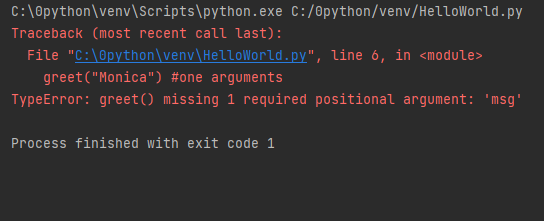1. 参数
在用户定义的函数主题中,我们学习了有关定义和调用函数的知识。 否则,函数调用将导致错误。 这是一个例子。
例1. 两个参数的函数
def greet(name, msg):
"""This function greets to
the person with the provided message"""
print("Hello", name + ', ' + msg)
greet("Monica", "Good morning!") #two arguments
结果
|
1 |
Hello Monica, Good morning! |
在此,函数greet()具有两个参数。
由于我们已经使用两个参数调用了此函数,因此该函数运行平稳,并且没有任何错误。
如果使用不同数量的参数调用它,则解释器将显示错误消息。 下面是对此函数的调用,其中包含一个参数,没有参数以及它们各自的错误消息。
错误程序
def greet(name, msg):
"""This function greets to
the person with the provided message"""
print("Hello", name + ', ' + msg)
greet("Monica") # only one argument
def greet(name):
print ('Hello ', name)
greet('Steve') # calling function with argument
greet(123)
结果:
|
1 2 |
Hello Steve Hello 123 |
2.可变函数参数
到目前为止,函数具有固定数量的参数。 在 Python 中,还有其他方法来定义可以采用可变数量的参数的函数。
下面介绍这种类型的三种不同形式。
1)Python 默认参数
函数参数在 Python 中可以具有默认值。
我们可以使用赋值运算符(=)为参数提供默认值。 这是一个例子。
例2.1 有默认值的参数
def greet(name, msg="Good morning!"):
"""
This function greets to
the person with the
provided message.
If the message is not provided,
it defaults to "Good
morning!"
"""
print("Hello", name + ', ' + msg)
greet("Kate")
greet("Bruce", "How do you do?")
results:
Hello Kate, Good morning! Hello Bruce, How do you do?
在此函数中,参数name没有默认值,并且在通话期间是必需的(强制性的)。
另一方面,参数msg的默认值为”Good morning!”。 因此,在通话期间它是可选的。 如果提供了一个值,它将覆盖默认值。
函数中的任意数量的参数都可以具有默认值。 但是,一旦有了默认参数,它右边的所有参数也必须具有默认值。
这意味着非默认参数不能跟随默认参数。 例如,如果我们将上面的函数头定义为:
|
1 |
def greet(msg = "Good morning!", name): |
results
|
1 |
SyntaxError: non-default argument follows default argument |
2)Python 关键字参数
当我们调用带有某些值的函数时,这些值将根据其位置分配给参数。
例如,在上面的函数greet()中,当我们将其称为greet(“Bruce”, “How do you do?”)时,会将值”Bruce”分配给参数name,并且将”How do you do?”分配给msg。
Python 允许使用关键字参数调用函数。 当我们以这种方式调用函数时,参数的顺序(位置)可以更改。 对上述函数的后续调用均有效,并产生相同的结果。
例2.2 关键词参数,可以变换位置
def greet(name, msg="Good morning!"):
"""
This function greets to
the person with the
provided message.
If the message is not provided,
it defaults to "Good
morning!"
"""
print("Hello", name + ', ' + msg)
# 2 keyword arguments
greet(name = "Bruce",msg = "How do you do?")
# 2 keyword arguments (out of order)
greet(msg = "How do you do?",name = "Bruce")
#1 positional, 1 keyword argument
greet("Bruce", msg = "How do you do?")
results
|
1 2 3 |
Hello Bruce, How do you do? Hello Bruce, How do you do? Hello Bruce, How do you do? |
如我们所见,我们可以在函数调用期间将位置参数与关键字参数混合。 但是我们必须记住,关键字参数必须跟随位置参数。
在关键字参数之后放置位置参数会导致错误。 例如,函数调用如下:
例2.3 关键字参数之后放置位置参数会导致错误
def greet(name, msg="Good morning!"):
"""
This function greets to
the person with the
provided message.
If the message is not provided,
it defaults to "Good
morning!"
"""
print("Hello", name + ', ' + msg)
# 2 keyword arguments
greet(name="Bruce","How do you do?")
会导致错误:
|
1 |
SyntaxError: positional argument follows keyword argument |
3) Python 任意参数
有时,我们事先不知道将传递给函数的参数数量。 Python 允许我们通过带有任意数量参数的函数调用来处理这种情况。
在函数定义中,我们在参数名称前使用星号(*)表示此类参数。 这是一个例子。
例2.4 参数名称前使用星号(*)表示任意参数
def greet(*names):
"""This function greets all
the person in the names tuple."""
# names is a tuple with arguments
for name in names:
print("Hello", name)
greet("Monica", "Luke", "Steve", "John")
results:
|
1 2 3 4 |
Hello Monica Hello Luke Hello Steve Hello John |
在这里,我们调用了带有多个参数的函数。 这些参数在传递给函数之前被包装为一个元组。 在函数内部,我们使用for循环取回所有参数。
例2.5 while loop 函数参数
def greet(*names):
i=0
print('Hello ', end='')
while len(names) > i:
print(names[i], end=', ')
i+=1
greet('Steve', 'Bill', 'Yash')
print('\n')
greet('Steve', 'Bill', 'Yash', 'Kapil', 'John', 'Amir')
results
|
1 2 3 |
Hello Steve, Bill, Yash, Hello Steve, Bill, Yash, Kapil, John, Amir, |

